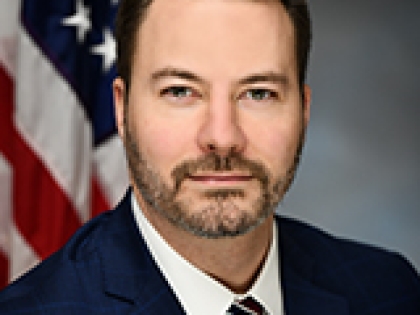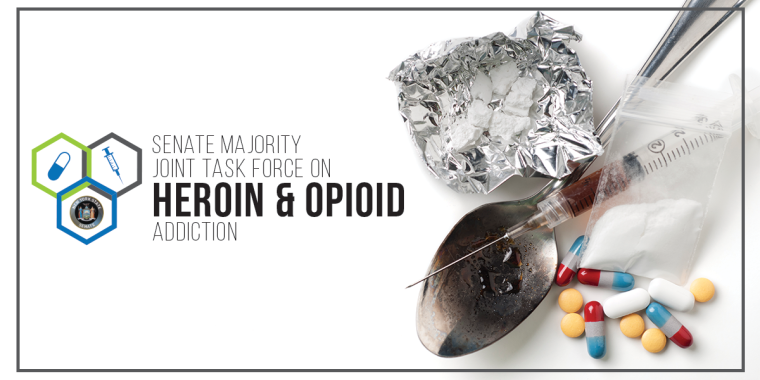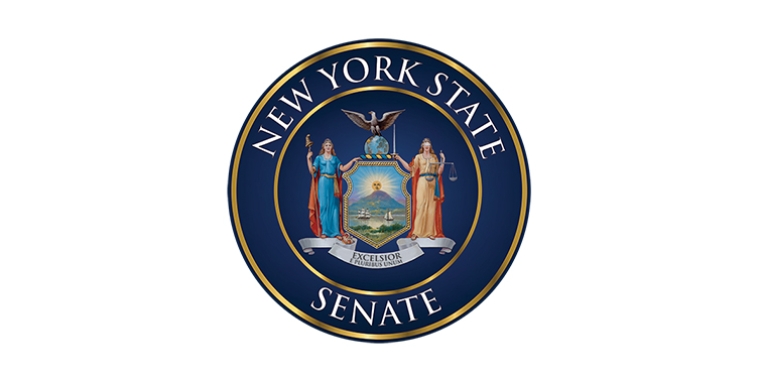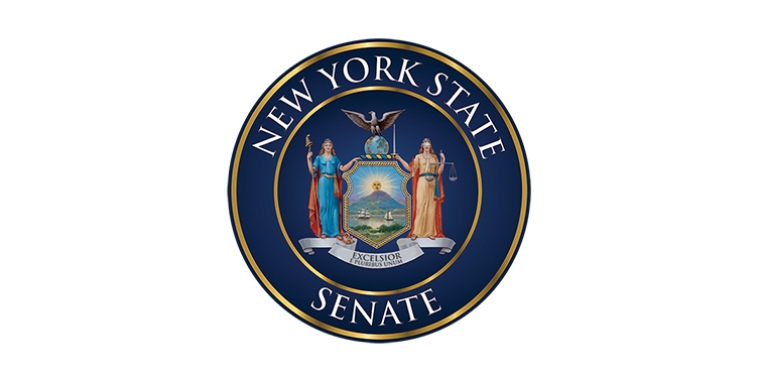
Ortt, Senate Heroin Task Force Release Comprehensive Report and Legislative Recommendations to Address Heroin and Opioid Crisis; Senate Passes Package of Bills to Tackle Drug Epidemic
Antoinette DelBel
May 17, 2016
-
ISSUE:
- Heroin and Opioid Addiction

The New York State Senate Joint Task Force on Heroin and Opioid Addiction Co-Chairs, Senators Rob Ortt (R,C,I – North Tonawanda), George A. Amedore, Jr. (R,C,I – Rotterdam) and Senator Terrence Murphy (R,C,I – Yorktown), today released a comprehensive report summarizing findings and recommendations to address the state’s widespread heroin and prescription opioid epidemic.
The report is a result of a series of Task Force forums held over the past year throughout New York State to examine the issues created by increased heroin and opioid abuse that has caused hundreds of deaths. Forum participants included law enforcement, treatment providers, health and mental health experts, victims and advocates. The findings of the report include legislative recommendations – developed from input collected at forums – to address shortcomings in the state’s existing drug prevention and treatment-delivery strategies.
Senator Ortt said, “This report represents the conclusion of over a year of traveling across the state - from Niagara to Long Island - and listening to those at the front lines of the heroin epidemic. Our recommendations incorporate the specific expertise from a broad array of community stakeholders - the heartbreaking stories from addicts and families, best practices from recovery and treatment specialists, preventative outreach from medical and education professionals, and enforcement tools for police officials. I'm hopeful that the Assembly and the Governor will join us to implement these legislative solutions to take back our communities and save lives. Although the report may be completed, let us be clear that as public officials and chairs of the task force, our work on this critical issue will not cease.”
In its report, the Task Force identified a four-pronged approach that would curb the growing drug epidemic and support those battling their addiction on the journey to recovery. These essential prongs were used as a focal point to develop the Task Force’s legislative and budgetary recommendations.
Prevention: Increasing awareness to better educate the public of the inherent risks involved in using heroin and prescription opioids, and taking advantage of technological advances available to deter the abuse of prescription drugs and prevent addiction;
Treatment: Recognizing the critical need for expanded and improved insurance coverage, and enhancing access to all forms of effective treatment – including inpatient, outpatient, and Medication Assisted Treatment – in order to help individuals return to stable and productive lives;
Recovery: Providing the proper supports, such as safe environments, stable employment, and opportunities to participate in diversion programs that avoid incarceration in order to facilitate successful recoveries from addiction; and
Enforcement: Implementing criminal justice reforms that give law enforcement the necessary tools to disrupt the supply of heroin and stop the diversion of opiate prescription medications within the state.
Senator George Amedore said, “As we travelled the state to gather input on how best to address the heroin crisis, we heard the same concerns in communities all over the state: current insurance coverage for addiction is not adequate; we need to increase prevention efforts; more treatment and recovery services need to be available in all parts of the state, and law enforcement needs resources to get high level dealers off the streets. This four pronged approach – prevention, treatment, recovery and enforcement – is the foundation for the report and recommendations we released today. These recommendations will help so many throughout the state who are struggling with addiction.”
Senator Terrence Murphy said, “This report is the result of a statewide collaborative effort to offer solutions needed to combat, and ultimately win, New York's ongoing war on heroin and opioid addiction. The stories we heard were real, the pain we felt significant, and the desire to bring about the necessary changes to ensure our fellow New Yorkers receive the help and care they desperately deserve brought us to the four corners of our great State. It is abundantly clear that more needs to be done to expand treatment options; more needs to be done to educate our kids, fellow parents and prescribers; more needs to be done to improve and increase recovery services; and more needs to be done to support law enforcement's efforts. If there was ever an issue for my colleagues on both sides of the aisle to unite over this would be that very cause.”
BUDGETARY RECOMMENDATIONS:
In addition, the report highlighted this year’s state budget commitment of $166 million for heroin and opioid crisis, treatment, outpatient, and residential services. Due to advocacy by the Senate’s Task Force members, the budget included an increase of $25 million above the Executive Budget’s original proposal.
The report recommends that this additional $25 million would support: Family Support Navigator and Navigator training programs; On-Call Peer programs; Adolescent Clubhouses to provide safe and welcoming spaces for teens; Recovery Community and Outreach Centers; Recovery Coach peer mentoring programs; a “Combat Heroin” Public Service Campaign; Opioid Overdose Prevention program; Opioid Medication Treatment program; Transitional Housing Opportunities; Local Government Unit Block Grants; School Resource Officer Training programs; and a Wraparound Services Demonstration Program.
SENATE PASSES 22 HEROIN-RELATED BILLS:
Of the Task Force’s legislative recommendations, which can be found in the report, the New York State Senate today passed a package of 22 bills that take a comprehensive approach to fighting the ongoing heroin and opioid addiction crisis. The bills reflect the need for improving prevention efforts, increasing access to treatment, expanding recovery options, and providing greater resources to law enforcement to aid in combating the crisis.
The bills will help prevent drug abuse, addiction and related crime, and provide families with better access to treatment and recovery programs. It builds on the laws enacted last year and in this year’s state budget, which increased funding for heroin treatment and prevention. In March, the Senate passed a bill (S994), sponsored by Senator Martin Golden (R-C-I, Brooklyn), that is also included in the Task Force Report. That measure enhances penalties for the sale of controlled substances on park grounds and playgrounds.
The bills passed today comprise the majority of the legislative action needed to address many of the issues raised by the state’s opioid crisis, with the remaining legislation expected to be voted upon before the end of this year’s session in June. The measures include:
Prevention:
- Limiting initial prescriptions of controlled substances S6091B, sponsored by Senator Kemp Hannon (R, Nassau): Limits an initial prescription of a Schedule II and III controlled substance to treat acute pain to a five-day supply. This bill ameliorates the excess volume of pills on the street, while also providing better continuity of care.
- Creating a Prescription Pain Medication Awareness Program S4348A, sponsored by Senator Hannon: Creates a continuing medical education program for practitioners with prescribing privileges. The Department of Health (DOH) and the State Education Department (SED) would establish standards for three hours of instruction to be completed prior to renewal of registration on topics including I-STOP requirements, pain management, appropriate prescribing, acute pain management, palliative medicine, addiction screening and treatment, and end-of-life care. Additionally, it allows for the consideration of existing curricula, and establishes exemptions for practitioners who would not require such training due to the nature, area, or specialty of his or her practice.
- Enhancing patient access to abuse-deterrent technology for opioids S6962A, sponsored by Senator Hannon: Helps prevent the abuse and diversion of opioid prescription drugs by ensuring patient access to abuse-deterrent opioids by prohibiting insurers from disadvantaging drugs approved by the FDA as abuse-deterrent.
- Ensuring proper opioid education to prescribed patients S7315, sponsored by Senators Murphy, Amedore, and Ortt): Requires the state Office of Alcoholism and Substance abuse Services (OASAS) to create either a card or pamphlet that will be included in every opioid prescription dispensed, which includes the following information: the risks of using such controlled substances; the physical, behavioral and advanced warning signs of addiction to such substances; the HOPELINE telephone contact number and text number (HOPENY) operated by OASAS; the procedures for safe disposal of drugs; and any other information the commissioner deems necessary. Additionally the bill requires the same information be provided to patients administered opioids while in the hospital, and requires acknowledgment of receipt of the information in the patient’s discharge plan.
- Establishing a Narcan kit registry S6516A, sponsored by Senator Amedore: Directs DOH to expand its reporting of opioid overdose data by tracking the number of opioid overdoses generally, in addition to the number of opioid overdose deaths. The Department is also required to examine data related to areas of the State experiencing high rates of opioid overdoses and if any areas of the State have reduced overdose rates after receiving State resources or services. These vital statistics will allow the state to gain a greater understanding of which areas of the state are struggling the most with this crisis, helping to better allocate funds.
- Providing instruction of mental health, alcohol, drug and tobacco use in junior and senior high schools - S5546A, sponsored by Senator Rich Funke (R-C-I, Fairport): Requires the Commissioner of Education to make recommendations to the Board of Regents relating to the adoption of instruction curriculum in mental health for junior and senior high school students and to provide school districts with current information on drug abuse issues. It is important that students be taught about mental health illness and stop the stigma that goes along with a diagnosis.
- Requiring patient counseling prior to issuing a prescription for a schedule II opioid - S7365, sponsored by Senator Fred Akshar (R-C-I, Colesville): Requires health care practitioners to consult with a patient regarding the quantity of an opioid prescription and the patient’s option to have the prescription written for a lower quantity. The physician must also inform the patient of the risks associated with taking an opiate medication, and the reason for issuing the medication must be documented in the patient’s medical record.
Treatment:
- Continuing education for credentialed alcoholism and substance abuse counselors -S7301, sponsored by Senators Amedore, Murphy, and Ortt: Requires credentialed alcoholism and substance abuse counselors (CASAC) to complete training in medication assisted treatment (MAT) as part of their continuing education requirement.
- Removing barriers to Medication Assisted Treatment (MAT) - S7317A, sponsored by Senators Murphy, Amedore, and Ortt: Removes a barrier to obtaining MAT by prohibiting managed care providers, under the medical assistance program, from requiring prior authorization for the dispensing of buprenorphoine for treatment of opioid addiction.
- Enhancing emergency intervention procedures - S6248B, sponsored by Senator Ortt: Extends the amount of time a person can be involuntarily held for a substance abuse disorder for emergency care from 48 hours to 72 hours and establishes criteria in which a person may be involuntary sent to treatment for a substance abuse disorder.
- Establishing assisted outpatient treatment for substance use disorders S631, sponsored by Senator David Carlucci (D, Rockland/Westchester)); Enables a court to order assisted outpatient treatment (AOT) for an individual with a substance use disorder who, due to his or her addiction, poses a threat to him or herself or others.
Recovery:
- Including for-profit providers in the RFP Process for substance use disorder and gambling programs S7446, sponsored by Senator Amedore: Authorizes OASAS to provide funding to substance use disorder and gambling programs operated by for-profit agencies. Current law prevents for-profit organizations, which provide similar treatment services, from applying for state contracts through OASAS. Allowing these entities to offer services, if they are cost-effective, will expand capacity and allow more individuals to enter treatment.
- Creating a Sober Living Task Force - S3989A, sponsored by Senator Thomas Croci (R, Sayville): Establishes the Sober Living Task Force, charged with establishing best practice guidelines for sober living residences that illustrate the most appropriate and effective environment for persons recovering from a chemical dependency. The task force must report to the Legislature no later than one year after the effective date of this act. Stable and safe alcohol and drug free housing promotes long term recovery for individuals suffering from a chemical dependency. The findings of this Task Force will allow the Legislature to determine the most appropriate way to support the housing needs of individuals in recovery.
Senator Croci said, “It is a crisis that requires action, not words. We are experiencing a true epidemic of heroin and opioid abuse and overdose deaths. It is an equal opportunity killer in every community and we are taking action to save lives and protect families.”
- Expanding treatment options for judicial diversion participants - S6874, sponsored by Senator Murphy): Establishes that participation in a judicial diversion program cannot be conditioned on the specific type or brand of drug prescribed to a defendant during the course of medically prescribed drug treatments under the care of a health care professional.
Enforcement:
- Facilitating the conviction of drug dealers - S100, sponsored by Senator Phil Boyle (R-C-I, Suffolk County): Allows someone to be charged with the crime of intent to sell if they possessed 50 or more packages of a Schedule I opium derivative, or possessed $300 or more worth of such drugs. Because heroin is so potent and is sold in relatively small quantities, dealers can carry enough of the drug to cause significant harm before triggering a felony charge of possession. Conversely, due to the nature of heroin use and addiction, most heroin users do not possess more heroin than they intend to use at that time, as someone high on heroin has no impulse control and will typically continue to consume all heroin available until it is gone.
- Expanding the crime of operating as a major trafficker S4177, sponsored by Senator Murphy: Helps strengthen the laws relating to major drug traffickers to more accurately reflect the nature of their criminal enterprises and increase successful prosecutions. The bill changes the number of persons needing to be involved and charged as part of a drug organization from four to three. Also, to reflect the low street prices of heroin, the bill lowers the minimum required proceeds from the sale of controlled substances during a 12 month period from $75,000 to $25,000.
- Creating Drug-Free Zones around drug or alcohol treatment centers and methadone clinics S7200, sponsored by Senator Akshar: Creates "drug-free zones" prohibiting the criminal sale of a controlled substance within 1,000 feet of a drug or alcohol treatment center and methadone clinic, similar to “drug-free zones” for schools. Statistics show that most often, drug dealers prey on these individuals by sitting in the immediate vicinity of a drug or alcohol treatment center or methadone clinic waiting for the addict to come out so they can sell them drugs. By designating the areas surrounding drug or alcohol treatment centers and methadone clinics drug as free zones, which comes with it an increased penalty, those predator drug dealers will be deterred from this deplorable practice.
- Establishing appropriate penalties as it relates to heroin sales S7012, sponsored by Senator Ortt: Creates appropriate levels of weight as it relates to the sale of heroin. Heroin weighs less than other drugs and therefore more doses of heroin are needed to trigger various criminal offenses.
- Enhancing judicial access to juvenile records for determining judicial diversion program eligibility S6317, sponsored by Senator John A. DeFrancisco (R-C-I, Syracuse): While the positive effects of judicial diversion cannot be disputed, current law does not give judges access to all criminal records - records that could exclude potentially violent or dangerous individuals from judicial diversion programs and prevent casualties. This bill would ensure that judicial diversion is utilized by granting judges the ability to unseal records when evaluating whether defendants should be placed in a judicial diversion program.
- Adding fentanyl to the controlled substance schedule S6632A, sponsored by Senator Croci: Designates three fentanyl derivatives as Schedule I controlled substances bringing New York’s schedule in line with the current Federal Schedule and increases criminal penalties for the sale of an opiate controlled substance containing a fentanyl derivative. According to the New York Times, fentanyl is 100 times as powerful as morphine and requires more Naloxone to reverse the effects of an overdose. The prevalence of fentanyl abuse has been on the rise due to its low cost. Drug dealers have been mixing fentanyl with heroin in order to produce a cheaper product, which often results in a lethal combination.
- Establishing Xylazine as a controlled substance S7397, sponsored by Senator Murphy: Ensures proper safeguards against the criminal diversion of Xylazine, by designating it as a schedule III controlled substance. Xylazine is a veterinary sedative which has been found mixed into heroin by drug dealers to increase the effects of the drug.
- Creating the crime of homicide by sale of an opioid controlled substance S4163, sponsored by Senator Amedore): Holds drug dealers accountable for lives lost as a result of their activities by creating an A-I felony for the unlawful transportation or sale of an opioid controlled substance that causes the death of another person.
The bills have been sent to the Assembly.
Share this Article or Press Release
Newsroom
Go to NewsroomNY Senate Republican Leader Rob Ortt Urges Common Sense Climate Policies
December 19, 2022

Senate Republican Conference Re-Elects Rob Ortt Minority Leader
November 30, 2022

Statement From Senate Republican Leader Rob Ortt
November 30, 2022

